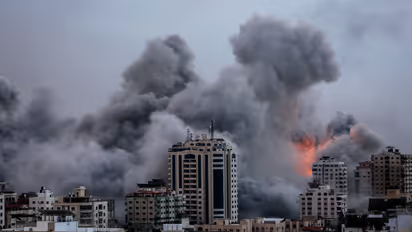Gaza's hospitals are teetering on the brink, warns WHO

Synopsis
In the midst of escalating injuries and fatalities due to ongoing airstrikes, medical supply shortages add to the crisis, hindering hospitals already stretched thin. Vital health services are disrupted, and infrastructure damage obstructs emergency medical teams.
The World Health Organization (WHO) issues a dire warning about the healthcare system in the Gaza Strip, stressing the urgency of delivering essential supplies to avert a looming humanitarian disaster. With a complete blockade in place, time is of the essence, the health body has said.
Gaza's hospitals are teetering on the brink, grappling with just a few hours of electricity daily, as they must ration dwindling fuel reserves and rely on generators for critical functions, the WHO said, adding that the precarious situation will worsen in a matter of days when fuel supplies run out, endangering the lives of the most vulnerable patients, including those requiring life-saving surgeries, patients in intensive care units, and newborns relying on incubators.
The ongoing airstrikes in Gaza have led to a surge in injuries and fatalities, compounded by severe shortages of medical supplies. This compounds the crisis, limiting the ability of already stretched-thin hospitals to provide adequate care for the sick and injured.
Crucial health services, including obstetric care, treatment for noncommunicable diseases like cancer and heart conditions, and care for common infections, have been severely disrupted. All health facilities are compelled to prioritize emergency care, leaving other medical needs unmet.
Furthermore, damaged infrastructure severely impedes emergency medical teams in the field. WHO has documented 34 attacks on healthcare facilities in Gaza since last Saturday, resulting in the tragic loss of 11 health workers, 16 injuries, and extensive damage to 19 health facilities and 20 ambulances.
Immediate access to humanitarian aid, encompassing healthcare services, medical supplies, food, clean water, fuel, and essential non-food items, is critical to responding to the pressing needs of a vulnerable population. Each passing hour intensifies the threat to lives, the global health body said.
WHO has called for an end to hostilities and the protection of healthcare and civilians against attacks. The urgent establishment of a humanitarian corridor, ensuring unhindered access to essential supplies, personnel, and patient evacuations, is imperative, the WHO said, reiterating its call for the safeguarding of healthcare services.
The WHO said that it stands ready to dispatch vital trauma and healthcare supplies through its logistics hub in Dubai, working in collaboration with partners to ensure prompt delivery to the Gaza Strip via the Rafah border crossing. Swift access through this crossing is essential to enable WHO and other humanitarian agencies to save lives without delay.
Check the Breaking News Today and Latest News from across India and around the world. Stay updated with the latest World News and global developments from politics to economy and current affairs. Get in-depth coverage of China News, Europe News, Pakistan News, and South Asia News, along with top headlines from the UK and US. Follow expert analysis, international trends, and breaking updates from around the globe. Download the Asianet News Official App from the Android Play Store and iPhone App Store for accurate and timely news updates anytime, anywhere.